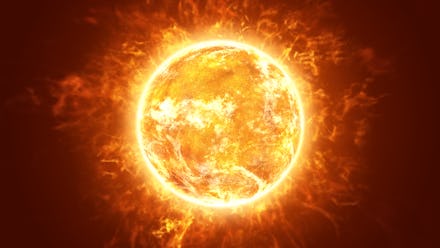We might blow past the Paris Agreement's warming threshold before 2025

We just got the weather report for the next five years, and it is going to be a scorcher. According to a new forecast published by the World Meteorological Organization, there is a 90% chance that we set a new record for hottest year ever by the end of 2025. There is also a 40% chance that we temporarily reach a global temperature that is 1.5 degrees Celsius hotter than pre-industrial levels — which is the mark that we are trying to avoid in order to stave off the worst effects of climate change.
The effects of this long-term heat wave could be devastating. The forecasters warned that warmer temperatures along the East Coast of the U.S. and through the Atlantic Ocean could result in hurricanes that happen more frequently and are stronger than average. The Northern Hemisphere, which is already experiencing warming of as much as 0.8 degrees Celsius, will likely see more droughts. "These are more than just statistics," WMO Secretary-General Petteri Taalas said in a statement. "Increasing temperatures mean more melting ice, higher sea levels, more heatwaves and other extreme weather, and greater impacts on food security, health, the environment, and sustainable development."
None of that sounds particularly reassuring about the state of the planet, and if you're waiting for the good news, well ... you're going to have to be extremely patient, because it might take a decade. Currently, things are getting worse and fast. Last year, the WMO projected that there was about a 20% shot that we'd exceed warming of 1.5 degrees Celsius, which is the Paris Agreement's goal threshold. Just one year later though, our likelihood to blow past that has doubled.
That's thanks in part to the fact that we're already pushing dangerously close to what is supposed to be our primary target for limiting global warming. The planet is 1.2 degrees Celsius warmer than pre-industrial levels, and the warming is extremely likely to continue in the near-term. It also turns out that the more information that we've gathered, the worse our current outlook appears: Leon Hermanson, a climate scientist at the United Kingdom’s Met Center, told HuffPost that recent findings reveal the planet "actually warmed more than we thought already." So that's not great.
It is worth noting that exceeding the 1.5-degree threshold now is not the worst thing in the world. It's not good! But it is not permanent, as global temperatures can fluctuate and can be changed by human activity. Importantly, while exceeding that marker is a good indicator that it's time to get our shit together, it is not reason to give up. The goal is to reach net-zero greenhouse gas emissions by 2050, and that goal has been set with the intention of keeping the planet from warming and staying above the 1.5-degree marker.
The planet reacts to human activity, but it often happens in a delayed fashion. As NASA explains, "There is a time lag between what we do and when we feel it." Some studies have suggested there is as much as a 40-year delay in how we experience climate change. So what we do now, we do to improve the future of the planet.
The next five years — with some of the hottest years ever on the way — are the result of our past negligence. That should serve as a warning for what could happen if we don't make changes now. Failing that, we'll continue to reap what we sow.